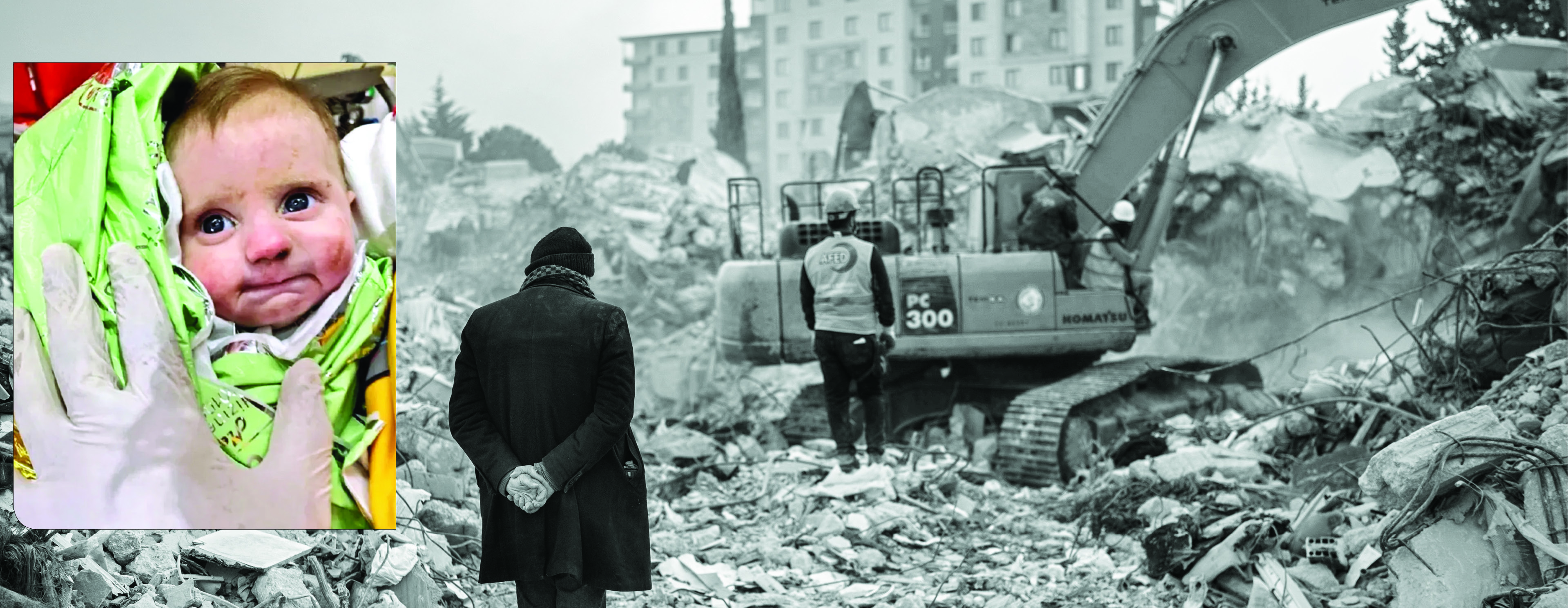Hope amid the gloom
Amid the all-pervasive gloom and doom in Türkiye and Syria, the human spirit of fighting back against all odds prevailed in countless instances — providing hope that is quintessential to human survival

Nothing unites people more tellingly than a shared sense of helplessness. Türkiye and Syria are presently living up to this adage in full measure. Humanity was put to test in the Middle East countries as one of the worst adversities in modern history struck them in the form of a series of tremblers. And, to our surprise, humanity came out triumphant!
Indeed, there is so much to lament and weep about — tens of thousands have lost their lives, children have been orphaned and families are homeless. For those who have survived, much more than the measure of physical damage, there has been a mental trauma — a trauma that will take years, if not decades, to pass by, a trauma that will overshadow every grin they’ll try to make.
But humanity is simply too grand to be subdued by occurrences such as these. Like true gold, when made to go through the furnace, humanity comes out more refined, and purer. A purity that was seen in the efforts of ravaged rescue persons, and even locals, to save those trapped under freezing debris, a purity that was seen in the ceasefires and the opening of long-junked borders for humanitarian assistance.
It is not futile to talk about the limited stories of survival, even if it is contrasted by a paramount loss of lives and property. In those far and few stories of survival lies the hidden gem called hope — a quintessential attribute for humans’ existence on Earth. In this article, we shall try to find traces of hope in survival stories from Türkiye and Syria, and retrospect what complementary measures can be taken to elicit tangible outcomes from what we have.
Survival in the freezing debris
Among the most fascinating survival stories, one is that of Aya — meaning ‘a sign from God’. Aya was still connected to the umbilical cord of her mother when the debris collapsed on the family. While her mother, father and four siblings couldn’t survive, Aya was destined to live.
In another case, a two-month-old baby was miraculously found alive and rescued 128 hours after the quake! 70-year-old Menekse Tabak must have had to give a tough fight to fate as she kept her breath under the concrete near the epicentre of the quake in Kahramanmaras. Still more curious is the case of Aleyna Olmez. On Thursday, over 240 hours after a devastating earthquake struck parts of Türkiye and neighbouring Syria, rescue teams in Kahramanmaraş pulled out the 17-year-old from the ruins of a flattened apartment complex. As astonishing as her unlikely rescue was 10 days after the earthquake, rescuers were successful in finding two more survivors on that day, 30-year-old Neslihan Kilic and 12-year-old Osman.
The rescue of the three survivors is nothing short of a miracle at this stage. In the case of Aleyna, dubbed the ‘miracle girl’, doctors reported that she was, all things considered, in relatively good condition despite her horrific ordeal. Her kidney function was intact, there was no hypothermia despite the freezing conditions and her body was responding well to fluid therapy.
Soon, she was reported to be communicating with her doctors and family. According to her doctors, they can only speculate as to how Aleyna managed to stay alive for so long under the rubble without eating or drinking. They have stated that it is possible that her state of inactivity may have helped her body preserve energy and endure adverse conditions until her rescue on Thursday.
As the combined death toll on Friday crossed 43,000, stories such as that of Aleyna continue to provide hope in this time of desperation. But, as bright as such hope can be, it is fleeting in the face of this disaster and the continuing toll it takes on the lives of those affected. There are other stories as well. A toddler, a father with his five-year-old daughter, and a 10-year-old girl were rescued from the debris in southern Türkiye almost a week after the quake. A two-year-old girl and a six-month pregnant woman were rescued after five days of the tremblers.
In his mid-twenties, Muhammed Habib recited the Qur’an to rescuers during the rescue operation, and it would seem that his God heard his prayers! In fact, there are many such awe-inspiring tales from the ravaged region. Such is the uniting power of adversity that the Kurdistan Workers’ Party — a terrorist group — avowed a temporary halt in fighting to facilitate recovery work. These aren’t just statistical examples of lifesaving. They entail a spirit of the fight against fate. They hide behind them many failed endeavours that would cost lives. These survival stories must have made many sinking faces lit up with hope — at least for a moment. These stories are palpable — they can be felt deep down the skin.
Snowballing crises
Even as rescue efforts continue and international aid agencies pour in hundreds of millions of dollars in vital aid, a second disaster is already looming. The earthquake has left millions homeless in Türkiye and Syria, exposed to the cold, bereft of clean food, drinking water and proper medical care.
The WHO has already warned of the increasing prevalence of infectious diseases, hypothermia, respiratory illnesses and mental health issues in the affected areas. Even for those not directly affected by the earthquake, the disaster could still affect the flow of vital medical and food supplies for some time to come. In Syria, the situation is arguably even worse. The devastating earthquake has only served to compound the suffering of a people that have faced over a decade of devastating civil war.
The war has destroyed hospitals, and facilities to grow food and filter water and generally devastated vital public infrastructure. The country has also been facing a growing cholera outbreak since September of last year, with tens of thousands already infected. Now, international health agencies say that the earthquake could significantly exacerbate the situation and put millions more at risk of catching the infectious disease.
To top it all off, aid and rescue operations are not easy to operationalise in Syria. The nation is divided between various warring factions and the Syrian government has not made it easy to send aid to parts of the country that are controlled by so-called rebel groups. If that was not enough, western sanctions on the nation are further complicating aid work in this desperate time of need. But, as the old Persian saying goes, ‘this too shall pass.’ Humanity has an extraordinary capacity for resilience, for moving on and for rebuilding what has been broken. But for once, maybe it would not be prudent to just move on and forget.
This might be the worst-in-a-century earthquake for Türkiye and Syria but not certainly the first or the last one. Regimes in the afflicted countries have not learnt their lessons to date. The positivity surrounding the survival saga is not good enough to cover up the state’s failure in rebuilding resiliently after every such disaster. Notably, most of the survival stories are covered primarily by the state media. Has the plight of the people moved the conscience of political masters to a point where they would consider mending their ways? Only time has the answer to it.
Beyond survival
The stories of miraculous survivors present a case to be relieved and hopeful, but not to be overwhelmed. The glimpses of humanity’s fighting spirit in Türkiye and Syria are just a silver lining that could guide the citizens to tide through the grave crisis, or at least provide some solace to bruised souls and bodies.
By the time this piece reaches to press, the rescue operations would probably be over. The aggrieved might have gained some conscience, and that would be the time to rebuild and recover. Experts believe that the survival rate of people after an earthquake is 74 per cent within 24 hours but falls to 22 per cent after 72 hours and just 6 per cent by the fifth day.
However, there are broader questions to be answered. This time around, perhaps it is more important to ask why so many had to die and why this earthquake was so devastating. To be sure, there is a temptation to blame fate, as some in the leadership of the affected countries have.
After all, what can mere men do in the face of such devastating natural disasters? But such an explanation would ignore the fact that there is clearly more to the current situation than simply bad luck. As noted by many experts in recent days, even if the earthquake itself was inevitable, the devastation it caused was not. In both Türkiye and Syria, experts have pointed to the quality of building construction as a likely contributing factor to the scale of the devastation.
In Türkiye, greedy builders and contractors have been blamed for rapidly constructing new buildings while using poor construction materials and unsafe building practices. There is also the problem of municipal and state officials issuing safety permits to such unsafe buildings and looking the other way even if obvious faults are discovered.
But it does not end there. There has been a concentrated effort in Türkiye at the highest levels to provide amnesty to building developers, allowing them to pay fines and circumvent usual safety and code requirements. This was reportedly done for political reasons as the construction boom in the nation over the last two decades was portrayed as a sign of major economic growth.
In neighbouring Syria, the matter is more straightforward. 12 years of a devastating civil war have made it impossible to not only source proper construction materials but to also enforce any kind of construction regulations. To add to all this, the disaster response in both nations has also been highly inadequate, with underfunded disaster agencies and lacking medical facilities to handle such extreme events when they do take place.
To sum it all up, this horrific tragedy was not simply an ‘act of god’. As such, any efforts to repair, renew and make whole the devastated regions must acknowledge the scale of human complicity in the disaster or risk repeating such needless loss of life in the future, again and again.
One can only hope that when Türkiye and Syria stand on their feet again, they stand resilient. When humanity was gasping for breath in Türkiye and Syria, the fighting spirit among humans got rekindled to give people a breather. It is extremely pertinent to build upon that.
Views expressed are personal



